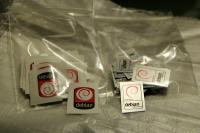Some more cool stuff with LLVM/Clang
Janvier 12th, 2013One of the drawback of C is the hard memory management.
It is because of this aspect that Clang provides a way to detect, at runtime, memory errors. Called Address Sanitizer, it allows, while the program is running, to keep track of the memory and detect typical errors (out-of-bound accesses, use of a variable after a free, etc).
# With the following packages (version 3.2-1~exp3)
$ sudo apt-get install clang clang-3.2 compiler-rt -t experimental
Taking the simple following example, even if the errors are obvious, compilers will accept this code.
#include <stdlib.h>
int main() {
char *x = (char*)malloc(10 * sizeof(char*));
free(x);
return x[5];
}
Built and run with:
$ clang -O1 -g -fsanitize=address -fno-omit-frame-pointer foo.c -o foo
$ ./foo &> memoryDebug.log
The previous command will generate a log file. Log which can be post processed with the asan_symbolize command.
$ asan_symbolize memoryDebug.log
which will give:
=================================================================
==21368== ERROR: AddressSanitizer: heap-use-after-free on address 0x7fb22e547f45 at pc 0x408c44 bp 0x7ffff60c10b0 sp 0x7ffff60c10a8
READ of size 1 at 0x7fb22e547f45 thread T0
#0 0x408c43 in main /tmp/foo.c:5
#1 0x7fb22d99f6ac in __libc_start_main /home/adconrad/eglibc-2.16/csu/libc-start.c:227
0x7fb22e547f45 is located 5 bytes inside of 80-byte region [0x7fb22e547f40,0x7fb22e547f90)
freed by thread T0 here:
#0 0x408c90 in __interceptor_free ??:0
#1 0x408c0a in main /tmp/foo.c:4
#2 0x7fb22d99f6ac in __libc_start_main /home/adconrad/eglibc-2.16/csu/libc-start.c:227
previously allocated by thread T0 here:
#0 0x408d50 in __interceptor_malloc ??:0
#1 0x408bff in main /tmp/foo.c:3
#2 0x7fb22d99f6ac in __libc_start_main /home/adconrad/eglibc-2.16/csu/libc-start.c:227
Shadow byte and word:
0x1ff645ca8fe8: fd
0x1ff645ca8fe8: fd fd fd fd fd fd fd fd
More shadow bytes:
0x1ff645ca8fc8: fa fa fa fa fa fa fa fa
0x1ff645ca8fd0: fa fa fa fa fa fa fa fa
0x1ff645ca8fd8: fa fa fa fa fa fa fa fa
0x1ff645ca8fe0: fa fa fa fa fa fa fa fa
=>0x1ff645ca8fe8: fd fd fd fd fd fd fd fd
0x1ff645ca8ff0: fd fd fd fd fd fd fd fd
0x1ff645ca8ff8: fa fa fa fa fa fa fa fa
0x1ff645ca9000: fa fa fa fa fa fa fa fa
0x1ff645ca9008: fa fa fa fa fa fa fa fa
Stats: 0M malloced (0M for red zones) by 1 calls
Stats: 0M realloced by 0 calls
Stats: 0M freed by 1 calls
Stats: 0M really freed by 0 calls
Stats: 0M (128 full pages) mmaped in 1 calls
mmaps by size class: 8:2047;
mallocs by size class: 8:1;
frees by size class: 8:1;
rfrees by size class:
Stats: malloc large: 0 small slow: 1
==21368== ABORTING
The main advantage compare to valgrind is that asan is supposed to be way more faster.
Threads can be also tricking to develop.
With the following example from stolen from upstream:
#include <pthread.h>
int Global;
void *Thread1(void *x) {
Global = 42;
return x;
}int main() {
pthread_t t;
pthread_create(&t, NULL, Thread1, NULL);
Global = 43;
pthread_join(t, NULL);
return Global;
}
$ clang -fsanitize=thread -g -O1 foo2.c -fPIE -pie -o foo
$ ./foo
==================
WARNING: ThreadSanitizer: data race (pid=21416)
Write of size 4 at 0x7f2f1a214a50 by thread 1:
#0 Thread1 /tmp/foo2.c:4 (exe+0x00000000f850)
Previous write of size 4 at 0x7f2f1a214a50 by main thread:
#0 main /tmp/foo2.c:10 (exe+0x00000000f8a4)
Thread 1 (tid=21417, running) created at:
#0 pthread_create ??:0 (exe+0x00000001267e)
#1 main /tmp/foo2.c:9 (exe+0x00000000f894)
==================
ThreadSanitizer: reported 1 warnings
Note that clang also provides scan-build, a static analyzer for memory issues. Not as powerful as the Address Sanitizer (it only works on a file), it provides some excellent reports. See the Wouter's blog post on this subject or the automatic report of scan-build on Scilab.
Mini Debconf 2012 - videos and feedbacks
Décembre 12th, 2012A bit more than two weeks after the Mini Debconf in Paris, I am glad to say that the videos of the event are finally published (the sound is not very good for the 4 first presentations, sorry about that).
They will be also available on the new IRILL website with a video player when ready.
All slides are also available on the page of the event.
I believe that there is a consensus about the quality of the event. We had around 150 people attending to the event, many interesting and various talks.
As usual, it was nice to meet some old and new friends from Debian.

Group picture by Frederic Lehobey
For those who wonder, I am confident there will be a 2013 Parisian Mini Debconf.
Various feedbacks about the event:
Lucas Nussbaum
Stefano Zacchiroli
Vincent Untz
Raphael Hertzog
Pietro Abate
Logilab (Julien Cristau)
The 'official' Debian news
And, once more, many thanks to the sponsors!
Mini Debconf & merchandising
November 17th, 2012Next week end, November 24th and 25th, the mini Debconf will take place at EPITA in Paris.
Mehdi Dogguy and I worked hard on the organization and on building a great program for this 2012 conference. This mini debconf will cover many subjects like Gnome (both as upstream and downstream), the Release team, how the Linux is packaged in Debian, etc.
The keynote will be "Free software and Debian, 20 years after" by Roberto Di Cosmo.
Also, some merchandising will be proposed during the event by the association Debian France. Here is a quick list:
Polos

Long-sleeved polo
40 euros - 10 pieces

Sleeveless polo
25 euros - 100 pieces
Thanks to Tanguy Ortolo for taking take of the order.
Buff

Buff Debian
18 euros - 75 pieces.
It is described as Original Multifunctional Headwear. Real life example in video.
I love them!
Finally, we will sell two kinds of Debian branded Sticker Portable:

Sticker Debian
1 euro - 100 pieces.
They can be also ordered on the it2l website. Thanks to Jérôme Lemaire for providing these great products.
If these products are successful, we will probably produce more for FOSDEM!
For more information about the conference:
The official website
Wiki page for subscription
libc++: New C++ standard library in Debian
Août 15th, 2012Thanks to the work of Andrej Belym, Debian has now a new C++ standard library. This work has been done in the context of the Google Summer of Code 2012.
Available in Debian Experimental, this new packages provides both the runtime libraries (libc++abi1) and the C++ headers (libc++-dev).
With this library, it is possible to build a C++-based program without any dependency on libstdc++.
For example, as detailed in README.Debian, with the (amazing) C++ code:
with clang++ (or g++) will give:// foo.cpp
#include <iostream>int main() {
std::cout < < "plop" << std ::endl;
return 0;
}
$ clang++ -o plop foo.cpp
$ ldd plop |grep c++
libstdc++.so.6 => /usr/lib/x86_64-linux-gnu/libstdc++.so.6 (0x00007f15791cb000)
Using libc++, it will drop the dependency on libstdc++ to use lib++
$ clang++ -stdlib=libc++ -o plop foo.cpp
$ ldd plop |grep c++
libc++.so.1 => /usr/lib/x86_64-linux-gnu/libc++.so.1 (0x00007f87464df000)
For the record, it is not that trivial to do with g++. The command being:
g++ -nostdlib -lc++ -lc++abi -std=c++11 -o plop /usr/lib/x86_64-linux-gnu/crt1.o /usr/lib/x86_64-linux-gnu/crti.o foo.cpp /usr/lib/x86_64-linux-gnu/crtn.o -isystem/usr/include/c++/v1 -lc -lgcc_s
Besides this change, libc++ provides a support of C++ 11, considered as "correct" against the C++11 standard by upstream.
// bar.cpp
#include <chrono>
int main() {
return 0;
}
clang++ -stdlib=libc++ -o bar bar.cpp
More information:
News on Debian & clang
Juillet 24th, 2012A couple week ago, during the last debconf (Debian Conference) in Managua/Nicaragua, I presented the latest developments about the inclusion of clang in the Debian architecture.
To sum up (details are available in the slides and the video), the rebuild of the Debian archive with Clang 3.1 increased the number of failures from 8.8 to 12.1%. The main reason is that further checks have been added to clang.
With Paul Tagliamonte as co-mentor and Alexander Pashaliyski as a GSoC student, we made great progress in bringing Clang as A new compiler in the Debian infrastructure.
The various feedbacks that I had during Debconf were pretty good. It interests many people for reasons like Quality Assurance (more checks), performances, hackability or to decorrelate Debian and GCC.
Build Debian with another compiler - Slides
Build Debian with another compiler - Video
A nice resume of my talk has been made by Michael Larabel on Phoronix:
Decoupling GCC From Debian By Using LLVM/Clang




